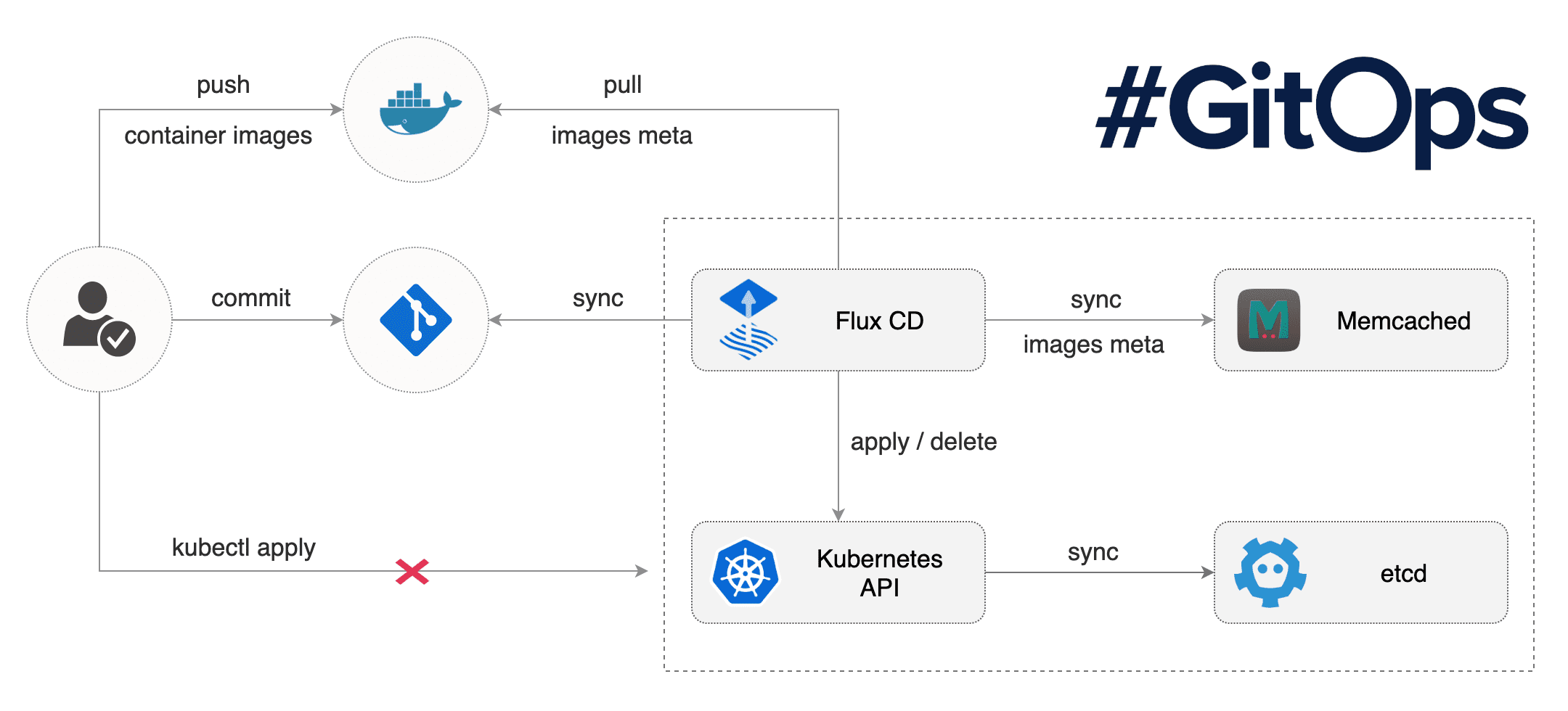On Flux v2 In an announcement in August 2019, the expectation was set that the Flux project would integrate the GitOps Engine, then being factored out of ArgoCD. Since the result would be backward-incompatible, it would require a major version bump: Flux v2.
After experimentation and considerable thought, we (the maintainers) have found a path to Flux v2 that we think better serves our vision of GitOps: the GitOps Toolkit. In consequence, we do not now plan to integrate GitOps Engine into Flux.
⚠️ This also means that Flux v1 is in maintenance mode.
We believe in GitOps:
- You declaratively describe the entire desired state of your system in git. This includes the apps, config, dashboards, monitoring and everything else.
- What can be described can be automated. Use YAMLs to enforce
conformance of the system. You don't need to run
kubectl, all changes go through git. Use diff tools to detect divergence between observed and desired state and get notifications. - You push code not containers. Everything is controlled through pull requests. There is no learning curve for new devs, they just use your standard git PR process. The history in git allows you to recover from any snapshot as you have a sequence of transactions. It is much more transparent to make operational changes by pull request, e.g. fix a production issue via a pull request instead of making changes to the running system.
Flux is a tool that automatically ensures that the state of a cluster matches the config in git. It uses an operator in the cluster to trigger deployments inside Kubernetes, which means you don't need a separate CD tool. It monitors all relevant image repositories, detects new images, triggers deployments and updates the desired running configuration based on that (and a configurable policy).
The benefits are: you don't need to grant your CI access to the cluster, every change is atomic and transactional, git has your audit log. Each transaction either fails or succeeds cleanly. You're entirely code centric and don't need new infrastructure.
Flux is most useful when used as a deployment tool at the end of a Continuous Delivery pipeline. Flux will make sure that your new container images and config changes are propagated to the cluster.
If you too are using Flux in production; please submit a PR to add your organization to the list!
In the first years of its existence, the development of Flux was very closely coupled to that of Weave Cloud. Over the years the community around Flux grew, the numbers of integrations grew and the team started the process of generalising the code, so that more projects could easily integrate.
With the following tutorials:
or just browse through the documentation.
Do you want to release your Helm charts in a declarative way?
Take a look at the fluxcd/helm-operator.
As Flux is Open Source, integrations are very straight-forward. Here are a few popular ones you might want to check out:
- Manage a multi-tenant cluster with Flux and Kustomize
- Managing Helm releases the GitOps way
- OpenFaaS GitOps workflow with Flux
- GitOps for Istio Canary deployments
- Fluxcloud to receive events from Flux
We welcome all kinds of contributions to Flux, be it code, issues you found, documentation, external tools, help and support or anything else really.
The Flux project adheres to the CNCF Code of Conduct.
Instances of abusive, harassing, or otherwise unacceptable behavior may be reported by contacting a Flux project maintainer, or the CNCF mediator, Mishi Choudhary mishi@linux.com.
To familiarise yourself with the project and how things work, you might be interested in the following:
Reminder that Flux v1 is in maintenance mode. If you have any questions about Flux v2 and future migrations, these are the best ways to stay informed:
- Join the flux-dev mailing list.
- Join the next talk and Q&A about Flux v2 on Nov 2, 10:00 am PT / 18:00 GMT
- Join the Flux v2 / GitOps Toolkit community meetings
If you have further questions about Flux or continuous delivery:
- Read the Flux docs.
- Invite yourself to the CNCF community slack and ask a question on the #flux channel.
- To be part of the conversation about Flux's development, join the flux-dev mailing list.
- File an issue.
Your feedback is always welcome!

